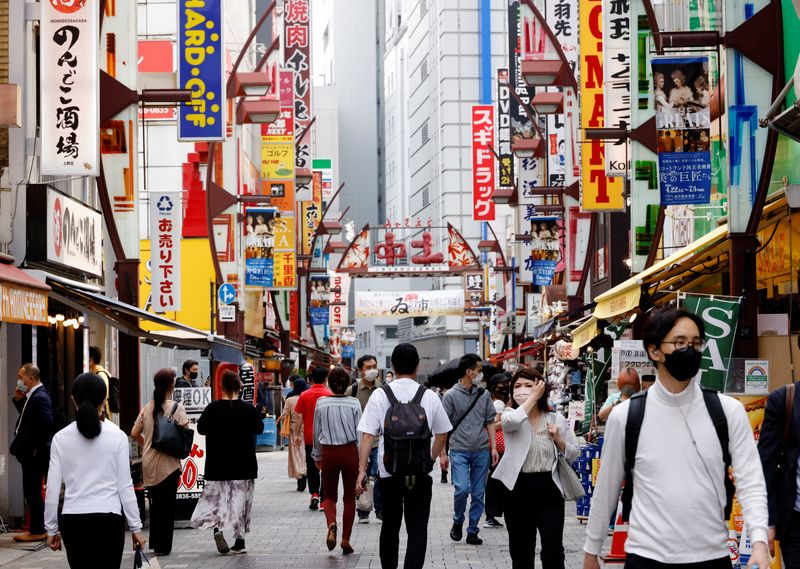Japan Q3, FY22 growth seen weaker as global economy stutters – Reuters poll
2022.07.19 07:54

FILE PHOTO: People make their way at Ameyoko shopping district in Tokyo, Japan, May 20, 2022. REUTERS/Kim Kyung-Hoon
By Kantaro Komiya
TOKYO (Reuters) – Japan’s economy is likely to grow at a slower pace than previously thought throughout the rest of the fiscal year, a Reuters poll showed, as growing risks of a global economic slowdown and supply woes torment Japanese exporters.
Manufacturers in the world’s third-largest economy are susceptible to the gloomier growth outlook in major trading partners such as the United States and China that are stoking recession and stagflation fears worldwide.
Analysts, however, still projected Japan’s growth to stay positive throughout the fiscal year until next March, the poll showed, thanks to an expected recovery of consumption, which accounts for over half of the country’s gross domestic product.
The economy was projected to expand an annualised 3.1% this quarter, the median forecast of 36 economists in the July 4-15 poll showed, lower than 3.5% estimated in a June survey.
Economists in the poll downgraded growth estimates for the October-December and January-March quarters slightly as well, while cutting those for last quarter even sharper, to 3.2% from June’s 4.1%.
“The biggest factor behind the overall downgrade is the growing sense of a slowdown in the U.S. economy,” said Harumi Taguchi, principal economist at S&P Global (NYSE:SPGI) Market Intelligence.
China’s zero-coronavirus policy could also prolong supply bottlenecks for Japanese exporters, she said.
Japan’s export-oriented manufacturers have been hit hard by a relentless rise in commodity prices after Russia’s invasion of Ukraine and COVID-19 lockdown measures in Chinese plants this year.
Analysts in the poll expected Japan’s industrial production to have contracted 3.8% in April-June from a year earlier, which will be followed by a meagre 2.2% recovery of output in July-September.
Domestically, the economy was likely to continue benefiting from a recovery in household spending on pent-up demand for services such as travel following the lifting of coronavirus curbs in March.
“Rising prices don’t seem to be pushing down private consumption now, though the impact could be more substantial if they linger,” said Takumi Tsunoda, senior economist at Shinkin Central Bank Research Institute.
A recent rise in coronavirus cases has added uncertainties to the outlook for consumption, he said.
The median estimate of economists in the poll showed Japan’s annual core consumer inflation likely reaching 2.4% in October-December and then aligning with the Bank of Japan’s 2.0% target early next year.
But nearly 90% of analysts said any unwinding of the BOJ’s ultra-easy policy will not happen until 2023 or later.
PRIORITISE ENERGY
Asked which areas the government should focus on after the July 10 upper house election, which resulted in a convincing victory for Prime Minister Fumio Kishida’s ruling coalition, 19 of 27 economists, or 70%, said energy policy.
The Japanese premier said on Thursday he has asked the industry minister to have up to nine nuclear reactors operational in the winter, when power consumption grows.
Twelve analysts selected “foreign/security policy” in the question allowing two choices, while six picked “social security” and “rising prices”.
Five economists chose “COVID-19 pandemic”, two said “wage increases”, two selected “fiscal reform” and one said “growth strategy”.
Responding to a question on what would be the most likely impact on Japan’s economy if a heatwave persists throughout summer, 12 of 27 economists said that would be negative for both consumption and production, with some citing heightening risks of a power shortage.
Eight others said consumption would get a boost from the scorching heat but it would be negative for production, while five said it would be positive for consumption as well as output.
“A persistent heatwave will support consumer spending on tourism and lodging as well as more powerful, energy-efficient air conditioners,” said Chiyuki Takamatsu, chief economist at Fukoku Mutual Life Insurance.
(For other stories from the Reuters global long-term economic outlook polls package:)








